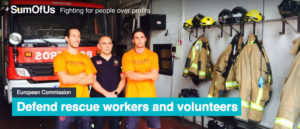As petitions are launched to stop the criminalisation of humanitarians, calls for the European Commission to intervene to change the law intensify.
The continuing threat of jail hanging over three Spanish fire-fighters, arrested in January 2016 on charges of attempted human trafficking and weapons possession, has led to the launch of at least two petitions, one by Wemove.eu and one by Sumofus.org, calling for changes to European laws which allow humanitarian acts of rescue and assistance to be prosecuted as people trafficking.
 Manuel Blanco, Enrique Rodríguez and Julio Latorre moved to the Greek island of Lesbos in 2015 and joined the NGO PROEMAID (Professional Emergency Aid) to answer distress calls from refugee ships in the Mediterranean. On 14 January 2016 they were arrested and charged with attempted human trafficking, as well as weapons charges for the possession of a rope knife, a mandatory element of the rescue uniform, they had on board. After three days in prison they were all released on bail and have since returned to Seville. Although a trial date has not yet been set, if found guilty all three men could face ten years in prison.
Manuel Blanco, Enrique Rodríguez and Julio Latorre moved to the Greek island of Lesbos in 2015 and joined the NGO PROEMAID (Professional Emergency Aid) to answer distress calls from refugee ships in the Mediterranean. On 14 January 2016 they were arrested and charged with attempted human trafficking, as well as weapons charges for the possession of a rope knife, a mandatory element of the rescue uniform, they had on board. After three days in prison they were all released on bail and have since returned to Seville. Although a trial date has not yet been set, if found guilty all three men could face ten years in prison.
A culture of suspicion and hostility
The charging of these three men is not the only case of what has become known as ‘crimes of solidarity’. A number of cases have made national and international media in the past couple of years, such as that of Danish children’s writer and campaigner Lisbeth Zornig, arrested in March 2016 for giving a family of Syrian refugees coffee and a lift, French farmer Cedric Herrou, given a suspended fine of €3,000 in February for helping African refugees enter France, French activist Felix Croft, arrested in Italy for giving a lift to a refugee family into France, and interpreter Francesca Peirotti, arrested in France for a similar offence. These individual cases are not exceptional, but rather part of growing pressure on individuals and on volunteer organisations to stop assisting refugees.
The increased suspicion and hostility towards volunteer organisations helping refugees can be seen across Europe, in acts such as the introduction of legislation in Greece requiring NGOs to register and list volunteers, and the intimidation of volunteers by police in France and Italy – but also in increasingly vocal criticisms by politicians and agencies. This pressure came to a head in January 2017 when Frontex, the EU border agency, suggested that there was collusion between Médecins Sans Frontières (MSF) and the people smugglers, an accusation MSF vehemently deny.
The ‘sus culture’ against voluntary organisations across Europe has been compounded by the actions of governmental officials and the rhetoric of politicians. Stigmatisation and dehumanisation of refugees – for example Polish leader Jarosław Kaczyński’s 2015 comment that migrants carry diseases such as dysentery and cholera to Europe, or Viktor Orbán’s routine characterisation of refugees as Muslims and Muslims as terrorists – adds to a climate where it is legitimate to abuse and criminalise their supporters. British prime minister Theresa May, as home secretary in 2015, described Eritrean refugees seeking asylum in Europe as ‘economic migrants’, and has long pursued policies creating a hostile environment for ‘illegal migrants’. More recently, ministers in both France and Italy have moved to ban the distribution of food to refugees, thereby cutting off support from groups such as Refugee Community Kitchen, Roya Citoyenne and Utopia 56.
There have been small victories: in March, the Lille Administrative Court suspended a new local bylaw banning food distribution on the basis that it interfered with basic rights, and in April Felix Croft was acquitted of migrant smuggling. However, the European Commission’s long-awaited report evaluating EU laws on facilitation of entry to Europe, published in March, was a blow to campaigners, refusing to recommend tougher safeguards to prevent the criminalisation of humanitarian rescue or assistance.
Related links
IRR News: Who will defend the space to protest?

A good article and on a very important issue.
There is a man who was arrested on Lesbos around the same time as those mentioned in the article – a lifeguard – maybe from a different Spanish outfit, but that needs checking. He faces similar sorts of charges. He is said to have witnessed a pushback. He is on bail, on a large reconnaissance, but unlike the three mentioned in the article, he has not been permitted to go home. It is understood that he is a Danish citizen and a Muslim. He has family in Denmark whom he has been separated from. It is understood that his trial is now fixed for 2018, a long way into the future.
>